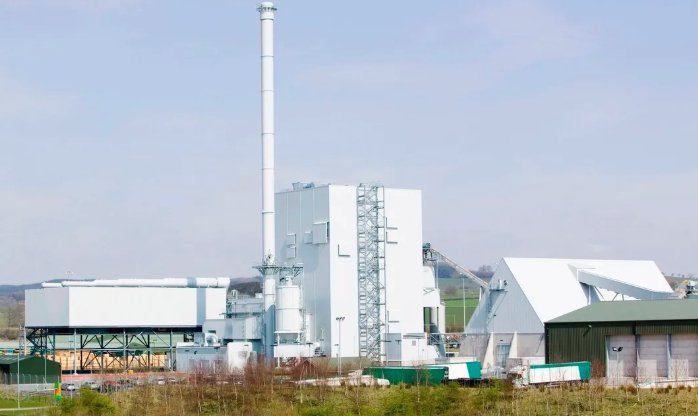E.ON’s Steven’s Croft biomass plant is stepping up as the backbone of Scotland’s new HyLion network — aiming to put green fuel in the tanks of cargo ships, passenger jets and even racing cars.
A New Player in the Green Fuel Game
It might sound like something from a science fair — turning waste wood and whisky fumes into clean fuel for the world’s biggest engines. But the HyLion alliance has a plan, and it’s serious.
Sitting at the heart of it is Steven’s Croft near Lockerbie. Since 2008, this biomass plant has been chewing through waste wood and recycled fibres to power tens of thousands of homes. Now, it’s set to do even more.
The big idea? Use renewable energy to make hydrogen and capture “biogenic CO2” — that’s the carbon dioxide released from organic material. Put them together and you get e-methanol, a fuel that could swap out dirty diesel and petrol in global industries.
It’s an idea that’s catching eyes from the North Sea to the Nürburgring.

How Does It Actually Work?
So, what’s the magic behind it? First off, the plant burns local timber scraps and coppiced wood. That part’s not new — it’s been saving around 140,000 tonnes of greenhouse gas emissions every year. But the twist is what happens next.
Step one: Grab the CO2 that would usually drift off into the sky.
Step two: Liquefy and store it.
Meanwhile, green hydrogen is generated with an electrolyser — that’s a fancy machine that splits water molecules apart using electricity. When these two ingredients meet, they’re converted into e-methanol. And that’s where the real fuel story begins.
One local engineer described it like brewing beer, but for ships and planes. A strange image, but you get the point.
Where Will E-Methanol Go?
Here’s what makes e-methanol so tempting: it’s flexible. The shipping industry’s been scrambling for cleaner fuels ever since climate targets got serious. Aviation? Same story. Even motorsport, with all its roaring engines, can’t ignore its carbon trail forever.
-
Cargo ships: huge fuel guzzlers, but ripe for low-carbon alternatives.
-
Passenger aircraft: desperate to meet emission standards.
-
Motorsport: chasing sustainable speed without losing thrills.
E.ON’s plant alone won’t power the entire globe. But it could set the pace. Production kicks off in 2028 at about 45,000 tonnes a year. Experts reckon that could jump tenfold as demand heats up.
One paragraph, one fact: even at pilot scale, that’s enough e-methanol to keep some serious engines turning.
The Partners and the Pit Crew
You don’t pull this off alone. The HyLion network is a mix of big names and fresh thinkers:
-
MHP Consulting, part of Porsche’s world.
-
McPhy Energy, known for hydrogen tech.
-
Bosch Manufacturing Solutions, with an eye on precision.
-
CO2-Recovery Ltd & The Carbon Removers — guess what they do.
-
Arup, Cadeler A/S, Mareneco and P1 Performance Fuels — all adding their piece.
Together, they’re cooking up a blueprint that could be exported worldwide. Scotland’s whisky distilleries, wind farms and forestry might just be the secret sauce.
Can It Really Make a Dent in Emissions?
Skeptics still hover on the edges. Critics argue that scaling up won’t be cheap or simple. But with tighter emission standards rolling out worldwide, the push for low-carbon fuels isn’t going anywhere.
A quick table puts it in perspective:
| Sector | Current Emissions | Potential Cut with E-Methanol |
|---|---|---|
| Shipping | ~3% of global CO2 | Up to 95% per vessel |
| Aviation | ~2.5% of global CO2 | Up to 90% per plane |
| Motorsport | Small slice, but high-profile | Up to 80% per event |
It won’t solve everything overnight. But it chips away at the oil barrel — one ship, one plane, one car at a time.
A Scottish Blueprint for Bigger Dreams
If HyLion’s plan works, Steven’s Croft won’t be the only player. Communities elsewhere could copy the model — renewable energy, captured CO2, local jobs, cleaner air.
One energy advisor summed it up: “This isn’t just about green bragging rights. It’s about creating a supply chain that works for people, not just profit.”
Basically, the race is on. Will e-methanol be the next big thing or just a stepping stone? Scotland’s betting on the former.


















